Unit 2 第四课时 Section B (2a-2e) 课件【大单元教学】人教版八年级英语下册Unit 2 I'll help to clean up the city parks
文档属性
| 名称 | Unit 2 第四课时 Section B (2a-2e) 课件【大单元教学】人教版八年级英语下册Unit 2 I'll help to clean up the city parks | 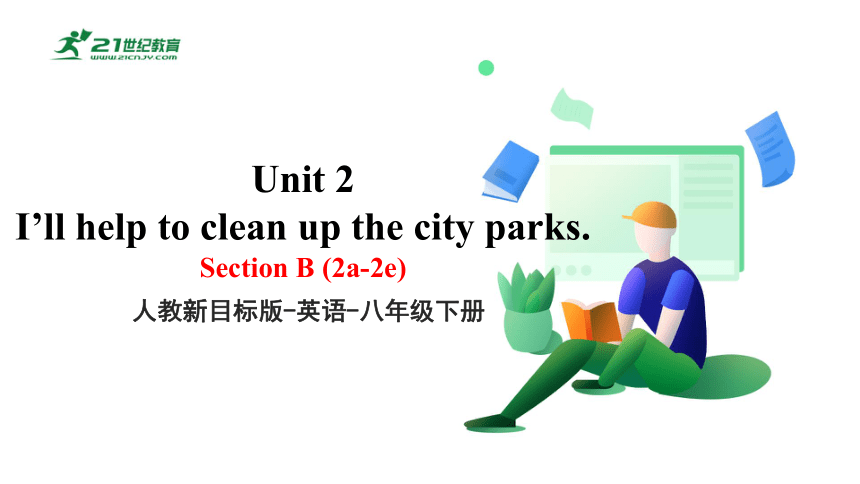 | |
| 格式 | pptx | ||
| 文件大小 | 6.7MB | ||
| 资源类型 | 试卷 | ||
| 版本资源 | 人教新目标(Go for it)版 | ||
| 科目 | 英语 | ||
| 更新时间 | 2024-02-01 17:05:33 | ||
图片预览

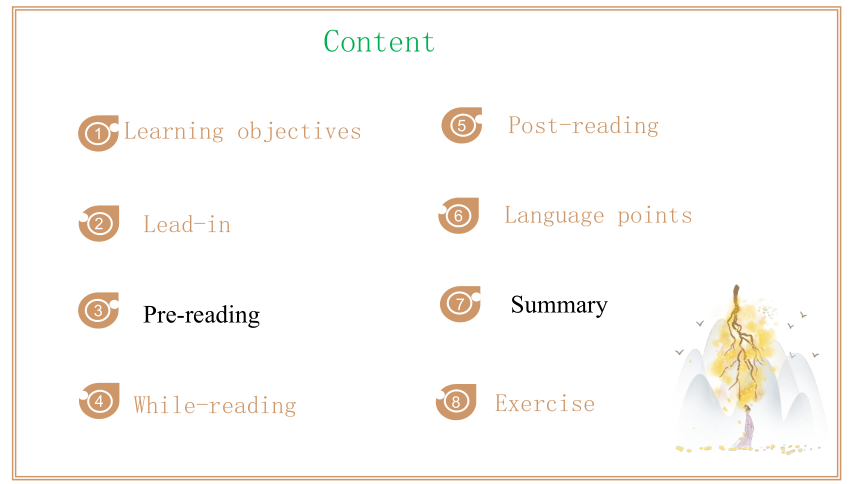
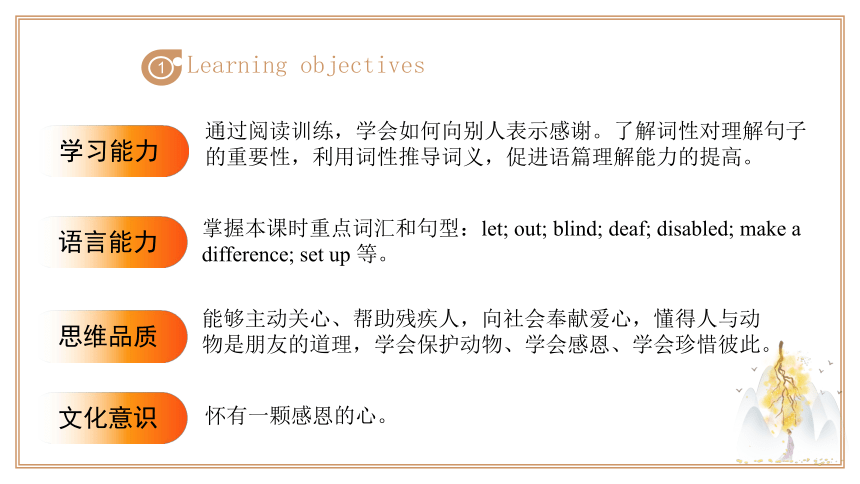
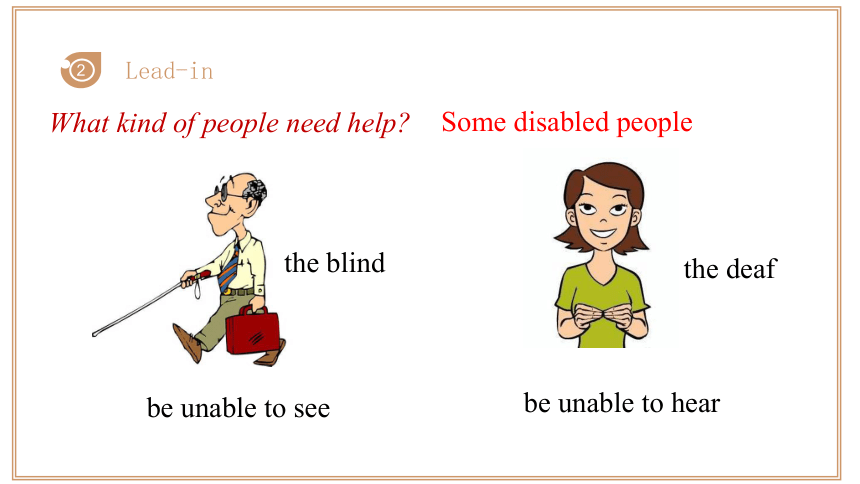
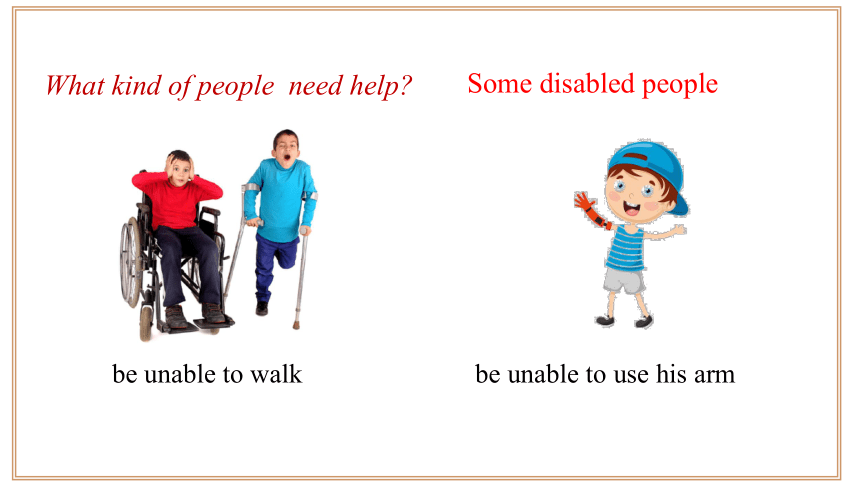
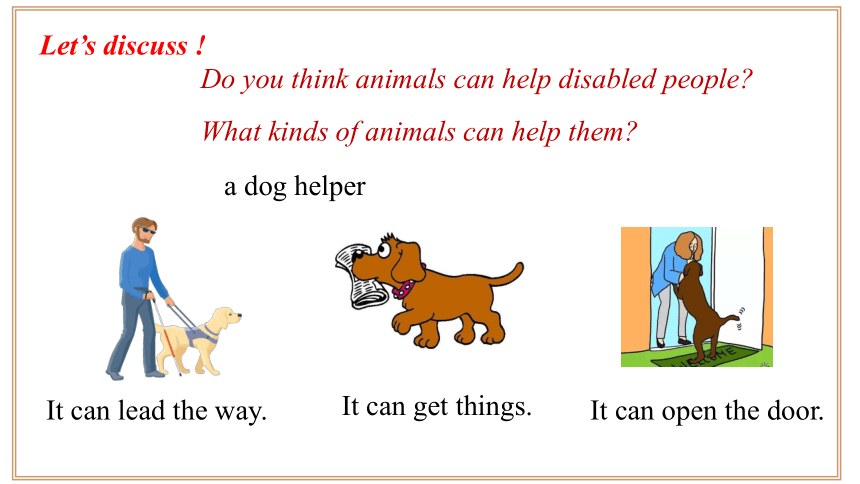
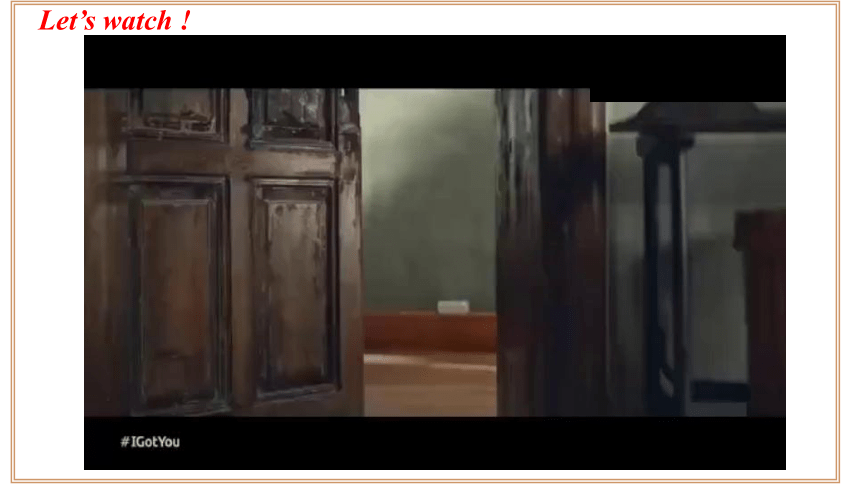
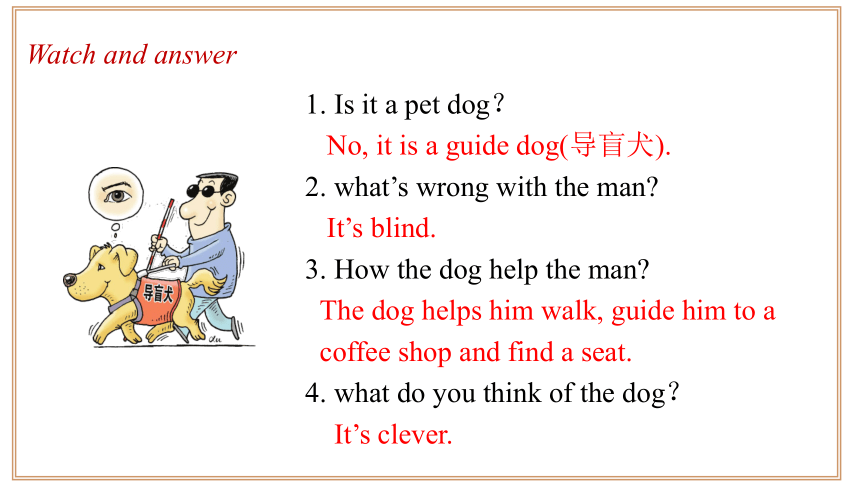
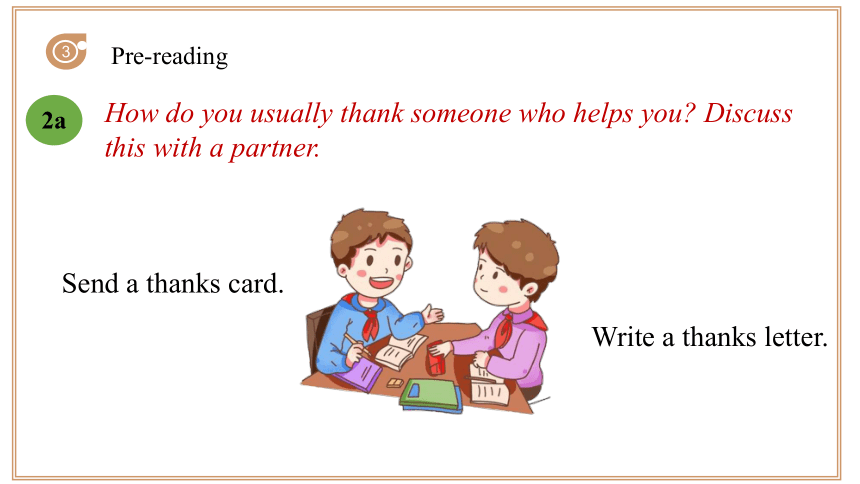
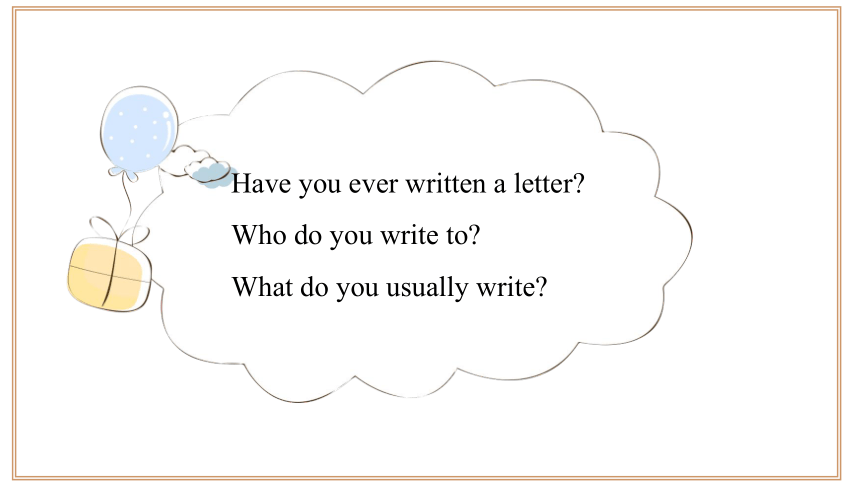
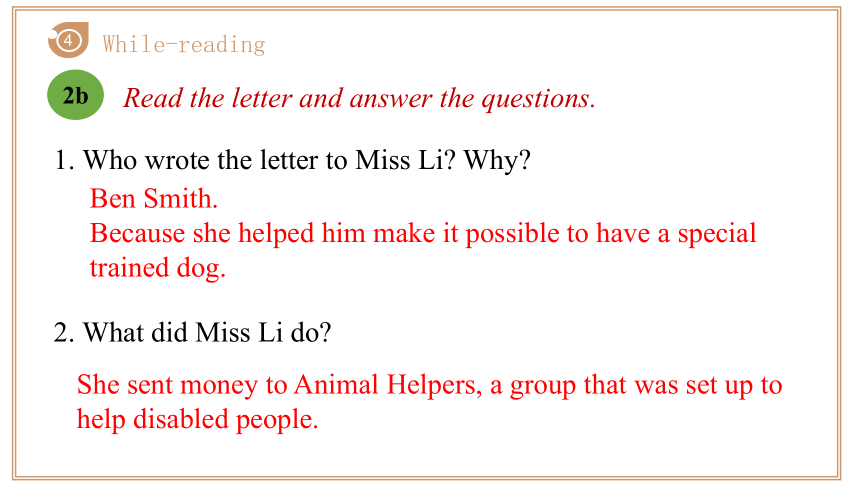
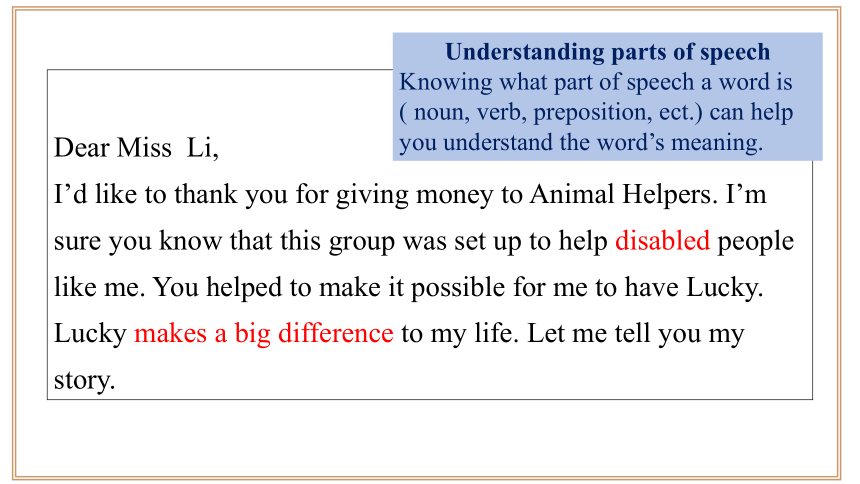
文档简介
(共39张PPT)
Unit 2
I’ll help to clean up the city parks.
Section B (2a-2e)
人教新目标版-英语-八年级下册
1
Learning objectives
Lead-in
2
Pre-reading
3
While-reading
4
Content
Post-reading
5
Language points
6
Summary
7
Exercise
8
文化意识
语言能力
思维品质
学习能力
1
Learning objectives
掌握本课时重点词汇和句型:let; out; blind; deaf; disabled; make a difference; set up 等。
通过阅读训练,学会如何向别人表示感谢。了解词性对理解句子的重要性,利用词性推导词义,促进语篇理解能力的提高。
怀有一颗感恩的心。
能够主动关心、帮助残疾人,向社会奉献爱心,懂得人与动
物是朋友的道理,学会保护动物、学会感恩、学会珍惜彼此。
What kind of people need help
Some disabled people
be unable to hear
the deaf
the blind
be unable to see
Lead-in
2
What kind of people need help
Some disabled people
be unable to walk
be unable to use his arm
What kinds of animals can help them
Do you think animals can help disabled people
a dog helper
It can get things.
It can open the door.
It can lead the way.
Let’s discuss !
Let’s watch !
1. Is it a pet dog?
No, it is a guide dog(导盲犬).
2. what’s wrong with the man
It’s blind.
3. How the dog help the man
The dog helps him walk, guide him to a
coffee shop and find a seat.
4. what do you think of the dog?
It’s clever.
Lead in
Watch and answer
How do you usually thank someone who helps you Discuss this with a partner.
2a
Send a thanks card.
Write a thanks letter.
Pre-reading
3
Have you ever written a letter
Who do you write to
What do you usually write
1. Who wrote the letter to Miss Li Why
Ben Smith.
Because she helped him make it possible to have a special trained dog.
2. What did Miss Li do
She sent money to Animal Helpers, a group that was set up to help disabled people.
Read the letter and answer the questions.
2b
While-reading
4
Dear Miss Li,
I’d like to thank you for giving money to Animal Helpers. I’m sure you know that this group was set up to help disabled people like me. You helped to make it possible for me to have Lucky. Lucky makes a big difference to my life. Let me tell you my story.
Understanding parts of speech
Knowing what part of speech a word is ( noun, verb, preposition, ect.) can help you understand the word’s meaning.
What would it be like to be blind or deaf Or imagine you can’t walk or use your hands easily. Most people would never think about this, but many people have these difficulties. I can’t use my arms or legs well, so normal things like answering the telephone, opening and closing doors, or carrying things are difficult for me. Then one day last year, a friend of mine helped me out. She talked to Animal Helpers about getting me a special trained dog. She also thought a dog might cheer me up. I love animals and I was excited about the idea of having a dog.
After six months of training with a dog at Animal Helpers, I was able to bring him home. My dog’s name is Lucky — a good name for him because I feel very lucky to have him. You see, I’m only able to have a “dog helper” because of your kindness! Lucky is very clever and understands many English words. He can understand me when I give him orders. For example, I say, “Lucky! Get my book,” and he does it at once.
Lucky is a fantastic dog. I’ll send you
a photo of him if you like, and I could
show you how he helps me. Thank you
again for changing my life.
Best wishes,
Ben Smith
Read aloud and then complete the passage below.
Ben Smith thanks Miss Li for ______ money to Animal Helpers, a group that helps disabled people like Ben. Ben can’t do many _______ things like answering the telephone, opening and closing doors, or ________ things.
Lucky is a _____________ dog. He can ____ many _______ people like Ben live more ______ (happy). Lucky is smart and can understand many _______ words. He is helping to change Ben’s life for the better.
giving
normal
carrying
special trained
help
disabled
happily
English
Look at the list of words below. Circle the part of speech of each word and make your own sentences with these words.
1. group (adj. / n. )
_______________________________________________
2. disabled (adj. / adv. )
_______________________________________________
3. difference (adv. / n. )
_______________________________________________
We’d better go in a group.
I know that a lot of disabled people need our help.
Can you find the difference between the two pictures
2b
4. imagine ( v. / n. )
_________________________________________________
5. difficulties ( n. / adj. )
_________________________________________________
6. normal (adv. / adj. )
__________________________________________________
You can easily imagine my surprise.
Each family has its own difficulties.
A person’s normal temperature is 37 degrees Centigrade.
7. training (adv. / n. )
_______________________________________________
8. kindness ( n. / v. )
______________________________________________
Nurses have several years of training.
Good looks are not as important as kindness.
Use the information in the letter to make true sentences by matching the different parts.
SUBJECT
Miss Li
Ben Smith
Lucky
Animal Helpers
VERB
can get
trains
sent
wrote
OBJECT
a letter to Miss Li.
money to Animal Helpers.
animals like Lucky.
things for disabled people.
2d
Discuss the questions with a partner.
1. In what other ways do you think dogs are able to help people
Dogs are able to help people by looking after the house, taking care of sheep, helping people find something and so on.
Horses, cows, elephants.
2. What other animals can we train to help people
2e
Post-reading
5
I’m sure you know that this group was set up to help disabled
people like me.
be sure that“认为……一定会;确信”,主语必
须用表示人的名词或代词来充当,that可以省略。
be sure后面还可以接由whether,where,when,who等引导的名词性从句,这时主句通常为否定形式。
Language points
6
2. I’m sure you know that this group was set up to help disabled people like me.
disabled作形容词,the disable意为“残疾人”,表示复数概念。
disabled adj. 丧失能力的;有残疾的
He was born disabled but he didn’t give up.
I worked as a volunteer to help the disabled.
【拓展延伸】 一些词加否定前缀dis-可以构成它的反义词,如:
agree (同意) — disagree (不同意)
appear (出现) — disappear (消失)
honest (诚实的) — dishonest (不诚实的)
3. You helped to make it possible for me to have Lucky.
make it +adj. + for sb. + to do sth.
使某人做某事变得……
例:这座石桥使村民过河变得方便起来。
This stone bridge makes it convenient for
the villagers to cross the river.
4. Lucky makes a big difference to my life.
make a difference (to)意为“(对……)有影响;(对……起)作用”。
difference 前面还可用 some,big,great 等词修饰,make a big /great difference表示“有重大影响;起很大作用”。
【拓展】
make no difference 没有影响;无关紧要 make all the difference关系重大;大不相同
例句:Whether she is rich or not makes no difference to me.她是否富有对我并没有影响。
A few kind words at the right time make all the difference.在适当的时候说几句体贴的话效果迥然不同。
5. Or imagine you can’t walk or use your hands easily.
imagine作动词, 意为“想象;设想”, 不可用于进行时。其名词形式为 imagination,意为“想象”。
例:你能想象在月球上的生活吗?
Can you imagine life on the moon
【拓展】
imagine doing sth. 想象做某事
imagine sb.to do sth. 想象某人做某事
imagine + that/what 从句
例:他试着想象是在月球上。
He tried to imagine being on the moon.
她把自己想象成一位有名的歌手。
She imagines herself to be a famous singer.
6. I love animals and I was excited about the idea of having a dog.
excited为形容词, “兴奋的;激动的; 感到兴奋的”
be excited about… 对……感到兴奋。
例:听说你们的成功,我们非常兴奋。
We are very excited about hearing of your success.
【拓展】exciting与excited
(1) exciting 令人兴奋的,表示某事(物)给人的
感受,主语一般是物,在句中作表语或定语。
例:这个消息让我们兴奋得无法入睡。
The news is so exciting that we can’t go to sleep.
(2) excited感到兴奋的,表示人的心理感受,作表语时,
主语一般是人。
例:每个人都为这胜利的消息而激动。
Everybody was excited at the news of victory.
1.____________ 建起;设立
2._______________ 同时
3.__________________________
使得某人有可能做某事
4.________________________
(对……)影响;有作用
5.________________ 接电话
6.________________ 开关门
set up
at the same time
make it possible for sb. to do sth.
make a difference (to)
answer the phone
open and close doors
_________________ 给他下命令
_________________ 立刻;马上
_________________ 能;能够
_________________ 改变我的生活
_________________ 独自;单独
_________________ 残疾人
_________________ 强项是……
__________________ 做志愿工作
give him orders
at once
be able to
change my life
by oneself
disabled people
be strong in
do the volunteer job
1.We have learnt some new words and expressions involving this part.
2. We have learnt an article how animal helpers can help people.
3.we have learnt to identify parts of speech (词性) of specific words and make sentences correctly;
Summary
7
一、根据句意及汉语提示完成句子。
1.I received a ______(信) from my mother just now.
2.The old woman is _____(失明的).She can't see anything.
3.You can't ________(想象) how beautiful my hometown is.
4.Tom is a ________(聪明的) boy. We all like him a lot.
5.His experience(经历) as a volunteer ________(改变) his life.
letter
blind
imagine
clever
changed
Exercise
8
二、用括号内所给单词的适当形式填空。
6.We felt ____________ (excite) about the good news.
7.Tom, take these ___________ (letter) to Mr. Black.
8.You should look at the _____________ (difficult) in another way.
9.She did six months' hard ___________ (train) before the race.
10.After the car accident,Robert became ______________
(disable) and lost his job.
excited
letters
difficulty
training
disabled
1. The baby stopped crying. (写出同义句)
The baby ______ cry __________.
2. cheer, Mum, came, to, with, up, make,
idea, him, an, up (连词成句)
_____________________________________________
3. 今日事,今日毕。
Never _______ till tomorrow what you can do today.
didn’t
any more
Mum came up with an idea to make him cheer up.
三、按要求完成句子。
put off
4. He gave away the bikes to the children. The children don’t have bikes. (改为定语从句)
He gave away the bikes to the children ________________.
5. 史密斯先生帮我们开办了个篮球俱乐部。
Mr. Smith ____________ a basketball club.
who have no bikes
helps us start
6.昨天的那场雨对比赛没有什么影响。
The rain _____ _____ _______yesterday to the game.
7.玛丽很像她妈妈。
Mary really_______ _____ her mother.
8.在我六岁时,我开始了学校的生活。
____ ____ _____ ______six, I started my school life.
9.我相信总有一天我的梦想会实现。
I believe my dream will______ ______
10.我觉得学习英语对我来说不藕7
I think ____ ____ _____ _____for me to learn English.
made no difference
takes after
At the age of
it is not easy
come true
谢谢
21世纪教育网(www.21cnjy.com)
中小学教育资源网站
兼职招聘:
https://www.21cnjy.com/recruitment/home/admin
Unit 2
I’ll help to clean up the city parks.
Section B (2a-2e)
人教新目标版-英语-八年级下册
1
Learning objectives
Lead-in
2
Pre-reading
3
While-reading
4
Content
Post-reading
5
Language points
6
Summary
7
Exercise
8
文化意识
语言能力
思维品质
学习能力
1
Learning objectives
掌握本课时重点词汇和句型:let; out; blind; deaf; disabled; make a difference; set up 等。
通过阅读训练,学会如何向别人表示感谢。了解词性对理解句子的重要性,利用词性推导词义,促进语篇理解能力的提高。
怀有一颗感恩的心。
能够主动关心、帮助残疾人,向社会奉献爱心,懂得人与动
物是朋友的道理,学会保护动物、学会感恩、学会珍惜彼此。
What kind of people need help
Some disabled people
be unable to hear
the deaf
the blind
be unable to see
Lead-in
2
What kind of people need help
Some disabled people
be unable to walk
be unable to use his arm
What kinds of animals can help them
Do you think animals can help disabled people
a dog helper
It can get things.
It can open the door.
It can lead the way.
Let’s discuss !
Let’s watch !
1. Is it a pet dog?
No, it is a guide dog(导盲犬).
2. what’s wrong with the man
It’s blind.
3. How the dog help the man
The dog helps him walk, guide him to a
coffee shop and find a seat.
4. what do you think of the dog?
It’s clever.
Lead in
Watch and answer
How do you usually thank someone who helps you Discuss this with a partner.
2a
Send a thanks card.
Write a thanks letter.
Pre-reading
3
Have you ever written a letter
Who do you write to
What do you usually write
1. Who wrote the letter to Miss Li Why
Ben Smith.
Because she helped him make it possible to have a special trained dog.
2. What did Miss Li do
She sent money to Animal Helpers, a group that was set up to help disabled people.
Read the letter and answer the questions.
2b
While-reading
4
Dear Miss Li,
I’d like to thank you for giving money to Animal Helpers. I’m sure you know that this group was set up to help disabled people like me. You helped to make it possible for me to have Lucky. Lucky makes a big difference to my life. Let me tell you my story.
Understanding parts of speech
Knowing what part of speech a word is ( noun, verb, preposition, ect.) can help you understand the word’s meaning.
What would it be like to be blind or deaf Or imagine you can’t walk or use your hands easily. Most people would never think about this, but many people have these difficulties. I can’t use my arms or legs well, so normal things like answering the telephone, opening and closing doors, or carrying things are difficult for me. Then one day last year, a friend of mine helped me out. She talked to Animal Helpers about getting me a special trained dog. She also thought a dog might cheer me up. I love animals and I was excited about the idea of having a dog.
After six months of training with a dog at Animal Helpers, I was able to bring him home. My dog’s name is Lucky — a good name for him because I feel very lucky to have him. You see, I’m only able to have a “dog helper” because of your kindness! Lucky is very clever and understands many English words. He can understand me when I give him orders. For example, I say, “Lucky! Get my book,” and he does it at once.
Lucky is a fantastic dog. I’ll send you
a photo of him if you like, and I could
show you how he helps me. Thank you
again for changing my life.
Best wishes,
Ben Smith
Read aloud and then complete the passage below.
Ben Smith thanks Miss Li for ______ money to Animal Helpers, a group that helps disabled people like Ben. Ben can’t do many _______ things like answering the telephone, opening and closing doors, or ________ things.
Lucky is a _____________ dog. He can ____ many _______ people like Ben live more ______ (happy). Lucky is smart and can understand many _______ words. He is helping to change Ben’s life for the better.
giving
normal
carrying
special trained
help
disabled
happily
English
Look at the list of words below. Circle the part of speech of each word and make your own sentences with these words.
1. group (adj. / n. )
_______________________________________________
2. disabled (adj. / adv. )
_______________________________________________
3. difference (adv. / n. )
_______________________________________________
We’d better go in a group.
I know that a lot of disabled people need our help.
Can you find the difference between the two pictures
2b
4. imagine ( v. / n. )
_________________________________________________
5. difficulties ( n. / adj. )
_________________________________________________
6. normal (adv. / adj. )
__________________________________________________
You can easily imagine my surprise.
Each family has its own difficulties.
A person’s normal temperature is 37 degrees Centigrade.
7. training (adv. / n. )
_______________________________________________
8. kindness ( n. / v. )
______________________________________________
Nurses have several years of training.
Good looks are not as important as kindness.
Use the information in the letter to make true sentences by matching the different parts.
SUBJECT
Miss Li
Ben Smith
Lucky
Animal Helpers
VERB
can get
trains
sent
wrote
OBJECT
a letter to Miss Li.
money to Animal Helpers.
animals like Lucky.
things for disabled people.
2d
Discuss the questions with a partner.
1. In what other ways do you think dogs are able to help people
Dogs are able to help people by looking after the house, taking care of sheep, helping people find something and so on.
Horses, cows, elephants.
2. What other animals can we train to help people
2e
Post-reading
5
I’m sure you know that this group was set up to help disabled
people like me.
be sure that“认为……一定会;确信”,主语必
须用表示人的名词或代词来充当,that可以省略。
be sure后面还可以接由whether,where,when,who等引导的名词性从句,这时主句通常为否定形式。
Language points
6
2. I’m sure you know that this group was set up to help disabled people like me.
disabled作形容词,the disable意为“残疾人”,表示复数概念。
disabled adj. 丧失能力的;有残疾的
He was born disabled but he didn’t give up.
I worked as a volunteer to help the disabled.
【拓展延伸】 一些词加否定前缀dis-可以构成它的反义词,如:
agree (同意) — disagree (不同意)
appear (出现) — disappear (消失)
honest (诚实的) — dishonest (不诚实的)
3. You helped to make it possible for me to have Lucky.
make it +adj. + for sb. + to do sth.
使某人做某事变得……
例:这座石桥使村民过河变得方便起来。
This stone bridge makes it convenient for
the villagers to cross the river.
4. Lucky makes a big difference to my life.
make a difference (to)意为“(对……)有影响;(对……起)作用”。
difference 前面还可用 some,big,great 等词修饰,make a big /great difference表示“有重大影响;起很大作用”。
【拓展】
make no difference 没有影响;无关紧要 make all the difference关系重大;大不相同
例句:Whether she is rich or not makes no difference to me.她是否富有对我并没有影响。
A few kind words at the right time make all the difference.在适当的时候说几句体贴的话效果迥然不同。
5. Or imagine you can’t walk or use your hands easily.
imagine作动词, 意为“想象;设想”, 不可用于进行时。其名词形式为 imagination,意为“想象”。
例:你能想象在月球上的生活吗?
Can you imagine life on the moon
【拓展】
imagine doing sth. 想象做某事
imagine sb.to do sth. 想象某人做某事
imagine + that/what 从句
例:他试着想象是在月球上。
He tried to imagine being on the moon.
她把自己想象成一位有名的歌手。
She imagines herself to be a famous singer.
6. I love animals and I was excited about the idea of having a dog.
excited为形容词, “兴奋的;激动的; 感到兴奋的”
be excited about… 对……感到兴奋。
例:听说你们的成功,我们非常兴奋。
We are very excited about hearing of your success.
【拓展】exciting与excited
(1) exciting 令人兴奋的,表示某事(物)给人的
感受,主语一般是物,在句中作表语或定语。
例:这个消息让我们兴奋得无法入睡。
The news is so exciting that we can’t go to sleep.
(2) excited感到兴奋的,表示人的心理感受,作表语时,
主语一般是人。
例:每个人都为这胜利的消息而激动。
Everybody was excited at the news of victory.
1.____________ 建起;设立
2._______________ 同时
3.__________________________
使得某人有可能做某事
4.________________________
(对……)影响;有作用
5.________________ 接电话
6.________________ 开关门
set up
at the same time
make it possible for sb. to do sth.
make a difference (to)
answer the phone
open and close doors
_________________ 给他下命令
_________________ 立刻;马上
_________________ 能;能够
_________________ 改变我的生活
_________________ 独自;单独
_________________ 残疾人
_________________ 强项是……
__________________ 做志愿工作
give him orders
at once
be able to
change my life
by oneself
disabled people
be strong in
do the volunteer job
1.We have learnt some new words and expressions involving this part.
2. We have learnt an article how animal helpers can help people.
3.we have learnt to identify parts of speech (词性) of specific words and make sentences correctly;
Summary
7
一、根据句意及汉语提示完成句子。
1.I received a ______(信) from my mother just now.
2.The old woman is _____(失明的).She can't see anything.
3.You can't ________(想象) how beautiful my hometown is.
4.Tom is a ________(聪明的) boy. We all like him a lot.
5.His experience(经历) as a volunteer ________(改变) his life.
letter
blind
imagine
clever
changed
Exercise
8
二、用括号内所给单词的适当形式填空。
6.We felt ____________ (excite) about the good news.
7.Tom, take these ___________ (letter) to Mr. Black.
8.You should look at the _____________ (difficult) in another way.
9.She did six months' hard ___________ (train) before the race.
10.After the car accident,Robert became ______________
(disable) and lost his job.
excited
letters
difficulty
training
disabled
1. The baby stopped crying. (写出同义句)
The baby ______ cry __________.
2. cheer, Mum, came, to, with, up, make,
idea, him, an, up (连词成句)
_____________________________________________
3. 今日事,今日毕。
Never _______ till tomorrow what you can do today.
didn’t
any more
Mum came up with an idea to make him cheer up.
三、按要求完成句子。
put off
4. He gave away the bikes to the children. The children don’t have bikes. (改为定语从句)
He gave away the bikes to the children ________________.
5. 史密斯先生帮我们开办了个篮球俱乐部。
Mr. Smith ____________ a basketball club.
who have no bikes
helps us start
6.昨天的那场雨对比赛没有什么影响。
The rain _____ _____ _______yesterday to the game.
7.玛丽很像她妈妈。
Mary really_______ _____ her mother.
8.在我六岁时,我开始了学校的生活。
____ ____ _____ ______six, I started my school life.
9.我相信总有一天我的梦想会实现。
I believe my dream will______ ______
10.我觉得学习英语对我来说不藕7
I think ____ ____ _____ _____for me to learn English.
made no difference
takes after
At the age of
it is not easy
come true
谢谢
21世纪教育网(www.21cnjy.com)
中小学教育资源网站
兼职招聘:
https://www.21cnjy.com/recruitment/home/admin
同课章节目录
- Unit 1 What's the matter?
- Section A
- Section B
- Unit 2 I'll help to clean up the city parks.
- Section A
- Section B
- Unit 3 Could you please clean your room?
- Section A
- Section B
- Unit 4 Why don't you talk to your parents?
- Section A
- Section B
- Unit 5 What were you doing when the rainstorm came
- Section A
- Section B
- Review of Units 1-5
- Unit 6 An old man tried to move the mountains.
- Section A
- Section B
- Unit 7 What's the highest mountain in the world?
- Section A
- Section B
- Unit 8 Have you read Treasure Island yet?
- Section A
- Section B
- Unit 9 Have you ever been to a museum?
- Section A
- Section B
- Unit 10 I've had this bike for three years.
- Section A
- Section B
